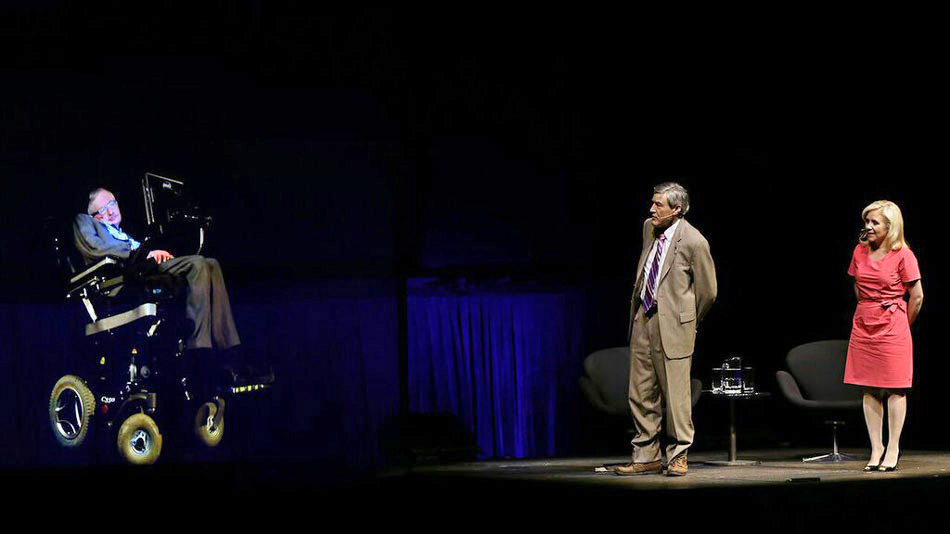Space ethics emphasized as exploration deepens

Stephen Hawking appears via hologram at the Sydney Opera House. At the presentation in April, he talked about the possibility of mankind migrating to another planet.
This year marked the 80th anniversary of the death of Russian scientist Konstantin Tsiolkovsky (1857-1935), the founding father of astronautics. He predicted: “Man will not always stay on Earth; the pursuit of light and space will lead him to penetrate the bounds of the atmosphere, timidly at first, but in the end to conquer the whole of solar space.”
So far, human beings have launched space probes to eight major planets and other main types of objects in the solar system. Voyager 2, NASA’s longest-running mission, reached the boundary of the heliosphere while New Horizons completed its flyby of Pluto and the Kuiper belt, said Zheng Yongchun, an associate research fellow at the National Astronomical Observatories under the Chinese Academy of Sciences.
Many-worlds interpretation
In April, Stephen Hawking, arguably the world’s most famous scientist, appeared as a 3D hologram on the Sydney Opera House stage.
He said: “We must continue to go into space for the future of humanity. I don’t think we will survive another 1,000 years without escaping this fragile planet.”
He said that there is a possibility that another universe exists outside of our own.
In reality, the many-worlds interpretation was never a fairy tale. It has gradually been adopted as mainstream theory in academia. According to a survey among 72 cosmologists and theoretical physicists conducted at the end of the 1980s, about 58 percent of scholars said they believed this is true. In 2003, American physicist Max Tegmark did a similar survey at an international conference on quantum physics. Thirty out of 40 scholars in attendance supported the hypothesis.
He Tianping, a professor from the Research Center for Philosophy of Science and Technology in Shanxi University, said that the significance of the many-worlds interpretation lies in the fact that it reexamines the relationship between mathematical formalism and physical interpretation, reflecting a transformation in human beings’ worldview as a part of the scientific revolution.
Space exploration altering daily life
In more than half a century, a series of scientific and technological innovations have been created as a result of space exploration, greatly promoting socioeconomic development and people’s daily lives, Zheng said.
For example, people all over the world depend on more than 800 telecommunication, navigation, remote-sensing and meteorological satellites in orbit every day for products and services, Zheng noted, adding that without these satellites, our lives would be unimaginable.
“Television and mobile phone signals come from telecommunication satellites, and weather forecasts from the weather satellites, while driving relies on navigation satellites,” Zheng said.
In addition, new materials and technologies invented during space exploration missions will mostly be transferred to the civilian areas, benefiting human beings as a whole.
China’s aerospace industry has boomed over the past decade, with its moon exploration project Chang’e at the core, and other space programs are developing at a steady rate. China plans to send 40 spacecraft in 20 launches by 2015, marking a record high.
Scholars suggest that the aerospace industry’s contribution to the national economy and social development is immeasurable.
“Due to the extreme specificity of the space environment and the infinite possibility of space resources, space science and technology have become a new growth point of other sciences and technology and an accelerator and multiplier for new economic development,” said Yin Dengxiang, director of the Research Center for Science, Technology and Society under the Chinese Academy of Social Sciences.
Space ethics stressed
Space exploration is not only a scientific and technical problem but also a matter of humanities and social sciences. In fact, scholars in the field have been following such issues as the establishment of a space city, the implementation of space immigration and social order and management in planning space society.
Zheng said that in recent years, the number of the extrasolar planets discovered has soared. “It is quite possible there are planets similar to the Earth that can breed living creatures. These extraterrestrial lives perhaps are just a mass of algae, or powerful beings with higher wisdom,” he said.
Yin did point out that with all of this advanced technology and these risks, space ethics that uphold responsibility, safety, fairness, justice and ecology must be formed to ensure the space exploration is carried out in a healthy, reasonable and orderly manner.
Zhang Qingli is a reporter at the Chinese Social Sciences Today.
